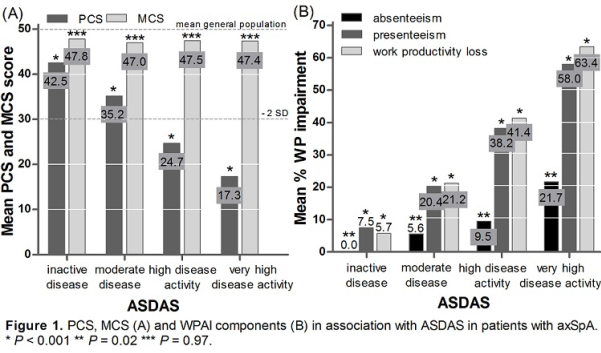Session Information
Session Type: Abstract Submissions (ACR)
Background/Purpose:
In early onset axial spondyloarthritis (axSpA), not much is known about the relationship between disease activity and work productivity loss (WPL) or disease activity and health-related quality of life (HRQoL) In this study we assessed the relationship between disease activity and WPL and HRQoL in early axSpA.
Methods:
The SPACE cohort recruited patients (n=345) with chronic back pain (≥3 months, ≤2 years, onset <45 years) in 5 European centres. In patients fulfilling the ASAS axSpA criteria (n=131), the following assessments were done: ASDAS and BASDAI (disease activity), BASFI (functional ability), SF-36 (HRQoL) and Work Productivity and Activity Impairment (WPAI). Patients were grouped according to ASDAS: inactive disease (<1.3), moderate disease (1.3-2.1), high disease (2.1-3.5) and very high disease activity (>3.5). BASDAI and BASFI scores ≥4 were considered as high disease activity and impaired function, respectively. HRQoL was reported as the SF-36 physical (PCS) and mental component summary (MCS) scores. Lower scores indicate decreased quality of life compared to the general population. Impact of disease on work productivity (WP) was defined as percentage of absenteeism and presenteeism and WPL (combines absenteeism and presenteeism) with greater scores indicating greater impairment.
Results:
Figure 1 shows that physical health-related quality of life (PCS) decreased significantly with increasing ASDAS. For example, in patients with inactive disease, the PCS was 42.5 compared to 17.3 in patients with very high disease activity. Moreover, absenteeism, presenteeism and WPL increased as ASDAS increased (figure 1b). MCS was not influenced by disease activity. PCS and WPL had a similar association with BASDAI (not shown) and BASFI (low vs.high BASFI; PCS 46.3 vs. 47.2, P=0.76; WPL; 30.9% vs. 66.7%; absenteeism; 7.1% vs. 24.9%; presenteeism; 28.9% vs. 61.1%, all P <0.001) .
Conclusion:
In early axial SpA, disease activity highly influences physical health-related quality of life and work productivity. These findings support aiming for clinical remission in patients with early axial SpA.
Disclosure:
A. Roeterink,
None;
M. de Hooge,
None;
R. van den Berg,
None;
H. Dagfinrud,
None;
R. Landewé,
None;
M. van Oosterhout,
None;
R. Ramonda,
None;
D. van der Heijde,
None;
F. van Gaalen,
None.
« Back to 2014 ACR/ARHP Annual Meeting
ACR Meeting Abstracts - https://acrabstracts.org/abstract/disease-activity-strongly-influences-work-productivity-and-physical-health-related-quality-of-life-in-early-axial-spondyloarthritis-data-from-the-space-cohort/

